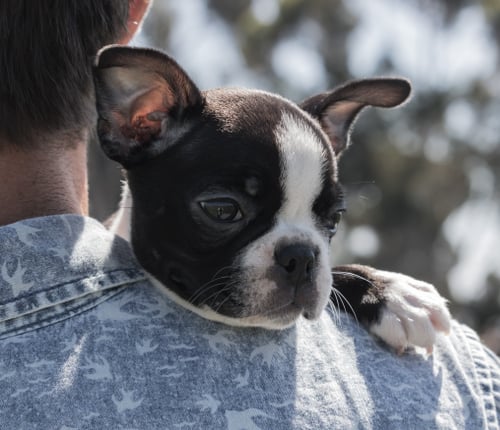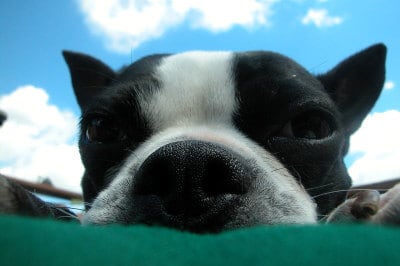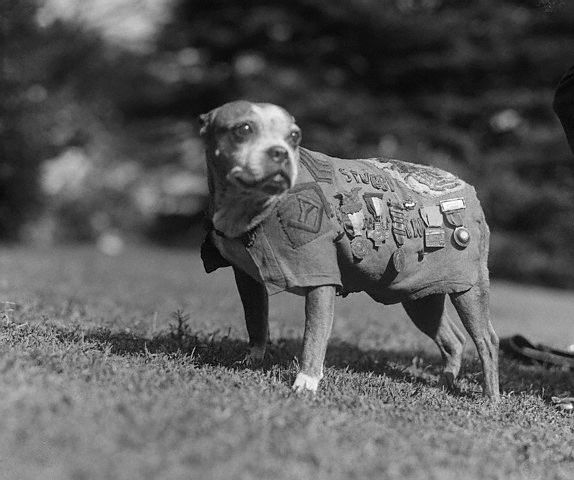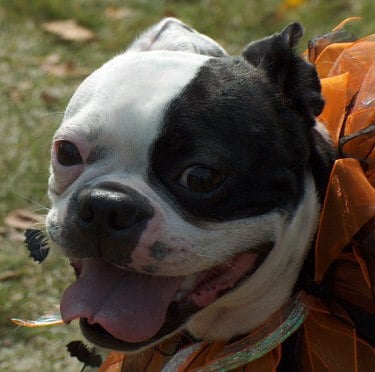
Nicknames can be misleading. Take the Boston Terrier, for instance. Its nickname is “the American Gentleman,” which makes it sound like a serious, reserved, and noble breed.
In reality, Boston Terriers seem to be made for lowbrow humor, with their funny faces, humorous antics, and legendary penchant for flatulence (a byproduct of those smashed snouts, which cause them to swallow a lot of air).
The nickname makes a lot more sense when you consider the origin of the breed. First, as suggested by their official name, the Boston Terrier is one of the rare terrier breeds that originated in America – the result of a cross between an English Bulldog and an English Terrier. Second, the prototypical black-and-white variety appears to be dressed in a gentlemanly tuxedo.
And finally, there’s the simple fact that the breed is known for being a lovable, people-pleasing, and gentle pet.
In case there’s any confusion, this is not a breed reserved for the rich and famous. It’s actually one of the most popular dog breeds around, and lives with people of all stripes. What’s a little flatulence when the Boston Terrier has so much else going for it?
Boston Terriers at a Glance
| Size | 12-25 pounds |
| Life Expectancy | 12-15 years |
| Overall Health | Fair, with potential respiratory and eye issues |
| Grooming Requirements | Low |
| Exercise Requirements | Medium |
| Barking Tendency | Low |
| Digging Tendency | Medium |
| Good With Children? | Yes |
| Good With Other Dogs? | Yes |
| Prey Drive/Tendency to Chase | Medium |
| Overall Terrier-tude | Gentlemanly |
Temperament
The Boston Terrier personality is almost always described in positive terms. They have the energy and intelligence common to terriers, without the hard-headedness or confrontational attitude.
For those who get a kick out of feisty, hard-nosed terriers, that might not be a big selling point. However, most people appreciate a dog that minds well, gets along with children and other dogs, and doesn’t have a powerful instinct to chase everything that moves.

Boston Terriers are especially known for providing comic relief. And no, we’re not just talking about the farts. They love attention, and have a way of keeping people entertained with their silly antics.
This is the type of breed you often see in duos or even trios, as the people who love them just can’t seem to get enough.
Health Problems & Life Expectancy
Bostons usually live about 12-15 years. However, their lifespan can be much longer with good breeding, proper care, and some luck.
That said, Bostons do have some nagging issues related to their unique features. Most of the health problems associated with this breed are due to that funny face. So-called brachycephalic (flat-faced) breeds often have trouble breathing, leading to problems ranging from snoring to overheating to serious conditions requiring surgery.

Those buggy eyes are another problem area, both because they’re easily injured and due to other conditions like glaucoma. They need to be checked on a regular basis for redness and irritation. For many Boston Terrier owners, cleaning the dog’s eyes with saline eyedrops is routine.
Boston Terrier Mixes and Variations
As is usually the case, a popular breed like the Boston Terrier makes a popular ingredient in hybrids. Here’s a list of the most common Boston Terrier mixes, complete with silly designer dog breed names:
| Breed Mixed With Boston Terrier | Resulting Designer Dog Breed |
|---|---|
| Beagle | Boglen Terrier |
| Bichon Frise | Bostchon |
| Brussels Griffon | Brusston |
| English Bulldog | English Boston Bulldog |
| Cairn Terrier | Cairoston |
| Chihuahua | Bochi |
| Chinese Shar-Pei | Sharbo |
| Cocker Spaniel | Boston Spaniel |
| Dachshund | Bodach |
| English Bulldog | English Boston Bulldog |
| French Bulldog | Frenchton |
| Jack Russell Terrier | Bojack |
| Japanese Chin | Boston Chin |
| Labrador Retriever | Boston Lab |
| Lhasa Apso | Bosapso |
| Miniature Pinscher | Bospin |
| Miniature Schnauzer | Miniboz |
| Papillon | Bostillon |
| Pekingese | Bostinese |
| Pomeranian | Pomston |
| Poodle | Bossipoo |
| Pug | Bugg |
| Rat Terrier | Brat |
| Scottish Terrier | Scobo Terrier |
| Shiba Inu | Shibo |
| Shih Tzu | BoShih |
| Siberian Husky | Siberian Boston |
| Toy Fox Terrier | Foxton |
| West Highland White Terrier | Bostie |
| Yorkshire Terrier | Boston Yorkie |
There’s also a big market for Teacup/Toy Boston Terriers. These dogs are purebred Bostons that are smaller than the breed standard, usually by design. While undeniably cute, there’s some controversy about whether intentionally breeding tiny dogs is a good idea.
5 Terribly Interesting Facts About Boston Terriers
The Boston Terrier has origins in the pit fighting dogs of England, but was bred to its current form in America. Here are some cool facts about the breed.
1
The Boston Terrier originated as a fighting dog, a cross between a bulky Bulldog and an aggressive terrier. But after years of breeding, there doesn’t appear to be much fight left in this dog. A Boston Terrier book from way back in 1906 says “While he is plucky, as might be expected from his ancestry, he is not quarrelsome.”
2
In the early days, the breed was referred to as the Round Head by some. Fortunately, the name Boston Terrier eventually won out.
3
The legendary Sergeant Stubby appears to be an early version of a Boston Terrier (he was picked up as a stray, so his origins are unknown). This dog traveled with the U.S. Army during World War I, and was credited with many heroic acts, including alerting soldiers to incoming poison gas.

4
The Boston Terrier was named the State Dog of Massachusetts in 1979. Massachusetts is one of just 13 states to recognize a state dog breed.
5
In dog shows, you won’t find the Boston Terrier competing in the Terrier Group. The AKC classifies dogs based on form, function, and heritage, and has placed the Boston in the catch-all Non-Sporting Group with breeds such as the Bulldog and Poodle.
Owning a Boston Terrier
There’s a reason these little dogs are so popular. They adapt extremely well to both active and less-active lifestyles, get along with everyone, and by most accounts, are simply delightful pets.
Here are some of the main pros and cons to consider before getting a Boston:
Health Issues. As mentioned, this breed suffers from a lot of different health problems. While most issues that crop up are not life-threatening, with this breed there is an increased chance of expensive vet bills should the dog require treatment or surgery.
Shedding. Chalk up another point in the Boston’s favor, as these dogs shed very little. The breed is generally classified as hypoallergenic.
Overheating. The combination of lots of energy and restricted breathing can lead to overheating in Boston Terriers. In warmer weather, they require lots of water and constant supervision to make sure they don’t suffer heat stroke.

City Life. Boston Terriers are well suited to urban living and make good apartment pets. Compared to other terriers, they aren’t as likely to get into confrontations with other dogs when taken on walks or to the dog park. That said, they definitely have a higher energy level than the large, lazy breeds, so make sure you’re up for some daily activity with your Boston.
Interested in getting a Boston Terrier? There are lots of responsible breeders to choose from, though finding one requires some research. Avoid buying from anyone who’s secretive about their operation or doesn’t guarantee the health of their dogs.
Adoption is another great option. If you can’t find a Boston at your local shelter, check out the many breed-specific rescue organizations around the country. While most people want a puppy, getting an adult dog offers many advantages as well (such as potentially skipping potty training, for example).
